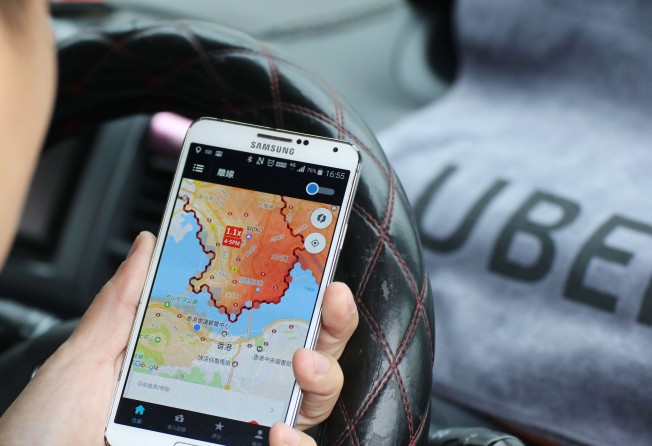Hong Kong Uber drivers defiant in the face of government crackdown
The firm itself vows to continue the fight to be legalised in city, after conviction of five drivers

It is business as usual for ride-hailing firm Uber and its diehard drivers who remain defiant despite the likelihood of increased government crackdowns sparked by Friday’s landmark court ruling against the business.
Uber Hong Kong’s general manager Kenneth She Chun-chi vowed yesterday the company would continue to fight for legal status in Hong Kong with its driving partners.
“We’ll continue to push for our ride-sharing business and its legalisation. We hope all our drivers will continue to stand by us,” he said outside the court building.
He made the remarks after five Uber drivers were fined HK$10,000 each on Friday for the conviction of driving without a permit and third-party insurance.
A government spokeswoman said it hoped the ruling would be a deterrent, adding they would continue to take enforcement action against any unlawful ride-sharing operations.
But She stressed that Uber had struck a deal with AIG in October last year to provide third-party coverage worth up to HK$100 million for any ride-sharing trip in the city.
The firm, founded in mid 2014, has so far served one million riders in Hong Kong using more than 30,000 drivers with 80 per cent of them working as part-timers.
Criticising the government for lagging behind in global technological advancement, She said what has happened was a step backwards in terms of innovative technology.
“Hong Kong’s current transportation regulations have failed to catch up with this new reality and now risks reducing choice and competition, failing the people of Hong Kong in the process,” he said.
She pointed out that the Road Traffic Ordinance, which governs the hired car permit system, had been outdated and had failed to cater to latest technological developments since its enactment some 40 years ago.
“I hope the government stops fixating on outdated laws and instead take a step forward in amending the law to make the ride-sharing business legitimate,” he urged.
Three Uber drivers who spoke to the Post also threw their full support behind the firm, saying they had confidence in Uber’s future in the city and that they would not be deterred by the court ruling.
Sam Chui, who works as a paralegal at a law firm, joined Uber five months ago and found that it could provide an avenue for him to earn some extra income – over HK$30,000 per month – while also providing the opportunity to promote his firm’s business to passengers.
“It’s really a happy job for me. Even my boss supports my work. I have confidence that Uber will overcome the present hurdles so I’ll continue with it,” he said.
Full-time Uber driver Jackie Hung, who quit his clerical job last year, said he was unfazed by the ruling. In fact, because of Uber’s popularity, he created a side business of a second-hand vehicle fleet of 17 cars for rental to Uber’s drivers.
“Before I only earned about HK25,000 a month and my job was boring. Now I am able to earn at least over HK$30,000 a month with a lot of freedom. Thanks to Uber I was able to build up my own car fleet,” said Hung who charges about HK$6,000 to HK$7,000 monthly per car rental.
He added: “The court ruling is not the final decision yet so I am not afraid. I strongly believe that the government would eventually amend the law and allow Uber to be regulated in Hong Kong and operate lawfully.”
Kenji Wong, an insurance agent who works part time for Uber, earning about HK$10,000 a month, said he would not quit the firm despite feeling anxious about the ruling.
“I will be more prudent in taking Uber orders but I will never quit the business. I support its vision. I really do think that its platform can offer a convenient service to riders. I can’t see why the government rejects this well-intentioned business,” he said.
I really do think that its platform can offer a convenient service to riders. I can’t see why the government rejects this well-intentioned business
But he agreed that the ride-hailing firm had affected the livelihood of taxi drivers to some extent.
“I think it’s fair to regulate Uber, such as requiring its drivers to obtain a taxi-driving licence and imposing a special tax on Uber,” he added.
However, a government source said they had no plans to legalise Uber and if the firm wanted to operate in Hong Kong legally, it had to be subject to the current hired car permit system .
“If we allow this kind of activity – unlicenced ride services for rewards – to be unregulated and expand without limits, it sends a wrong message to society that we encourage pak pai cars ... which will rock the very foundation of the public transport service and impede its healthy development,” a spokeswoman of the Transport and Housing Bureau said.
Pak Pai is Cantonese for “white card”, implying a citizen-owned automobile used as an illegal unlicensed taxi.
Meanwhile, the Motor Transport Workers’ General Union called for the government to prosecute Uber instead of its drivers, saying they were misled by the firm into violating the law.
“The real culprit is in fact Uber,” it said.